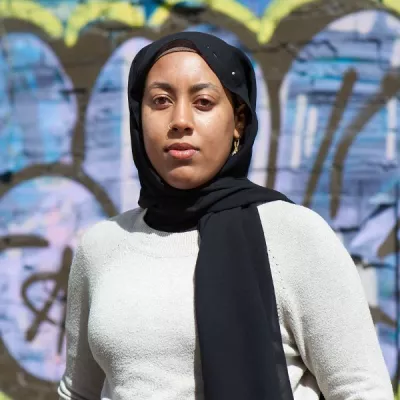Here's what you need to know about voting to help end youth homelessness in the 2024 General Election.
Register to vote
Deadline to register to vote is 18th June at 11.59pm.
Skip to the right section
Why is it important to vote?
When is the next general election?
How can I find out if I'm registered to vote?
How do I register to vote?
Can I register to vote anonymously?
Can I register to vote if I’m homeless or have no fixed address?
How can I vote?
What ID will I need?
How to apply for free voter ID?
What if I don’t have ID in my current name?
Why is it important to vote?
The General Election is your opportunity to choose an MP to represent you in the Houses of Parliament. This MP will be making decisions for you on important issues such as healthcare, education and housing.
By voting, you can influence matters that you care about. This is also your chance to take action if you are not happy with how the government is running things.
The more people who care about homelessness turn out to vote, the greater the likelihood that politicians will take action on this vital issue. The General Election is your opportunity to hold the government to account on tackling the housing crisis.
When is the next general election?
The next general election will be on 4th July 2024.
How can I find out if I’m registered to vote?
You must be registered to vote in order to vote in a general election. If you’re not sure if you’re registered, you can contact your local Electoral Registration Office.
How do I register to vote?
You can register to vote if you are:
- A British citizen
- An Irish or EU citizen living in the UK
- A Commonwealth citizen who has permission to enter or stay in the UK or who does not need permission
- A citizen of another country living in Scotland or Wales who has permission to enter or stay in the UK or who does not need permission
You can register to vote online. It usually takes about five minutes. You’ll be asked for your National Insurance number, but you can still register if you do not have one. After you’ve registered, your name and address will appear on the electoral register, unless you apply to register to vote anonymously.
Deadline to register to vote is 18th June at 11.59pm
Can I register to vote anonymously?
If you’re concerned about your name or address appearing on the electoral register, for example if you are worried about the safety of someone in your household, you can register to vote anonymously.
You will need to explain why you or someone in your household would be put at risk through your name being put on the electoral register. You will also need to provide a court document or an attestation from an authorised person to support your application.
Can I register to vote if I’m homeless or have no fixed address?
You can still vote if you're homeless, remanded in custody, or a patient in a mental health hospital. In order to vote, all you need to do is give an address of a place where you have lived in the past, the place where you're staying temporarily, or where you would be living if it were not for your current situation.
If you are homeless, you can register to vote by giving details of where you spend a substantial amount of your time. This could be a night shelter (for example, your Centrepoint accommodation), a day service you go to regularly, or even an address that's near to a park bench or the doorway to a shop.
How can I vote?
You can vote in person, by post or in proxy.
If you’re voting in person, you will cast your vote at a polling station, which is usually in a public building such as a school. You will know where you can vote when you receive your polling card through the post – however you do not have to take your polling card with you. On the day of the vote (‘polling day’), you can vote between the times of 7am and 10pm.
You can apply online or by post for a postal vote, however you must be registered to vote before you apply. The deadline to apply for a postal vote for the general election is 17:00 on Wednesday 19 June.
You can also apply to vote by proxy if you are unable to vote in person – for example if you are away on polling day or you have a medical issue or a disability that makes it difficult. The rules for voting by proxy have changed. If you applied for a proxy vote before 31 October 2023, this has expired and you need to apply again.
The deadline to apply for a proxy vote for the general election is 17:00 on Wednesday 26 June.
The deadline to apply for a postal or proxy vote in Northern Ireland is 17:00 on Friday 14 June 2024.
What ID will I need?
You will need to show photo ID in order to vote at the next General Election. Some of the types of ID accepted are:
- a UK or Northern Ireland photocard driving licence (full or provisional)
- a driving licence issued by an EU country, Norway, Iceland, Liechtenstein, the Isle of Man or any of the Channel Islands
- a UK passport
- a passport issued by an EU country, Norway, Iceland, Liechtenstein or a Commonwealth country
- a PASS card (National Proof of Age Standards Scheme)
Here’s a full list of acceptable ID.
How to apply for free voter ID?
For most forms of photo ID you will need to pay, so you may want to explore some alternatives.
If you don’t have a fixed address, it can sometimes be harder to produce photo ID due to the application costs and the inability to keep your ID safe. The government has introduced a new, free a proof of identification for voting in elections called a ‘Voter Authority Certificate’. You can use this to vote for a general election in person, but you cannot use it as identification for any other reason. You will need a recent, digital photo of yourself and your national insurance number.
The deadline to apply for free voter ID is by Wednesday 26th June at 5pm.
What if I don’t have ID in my current name?
The name on your ID must match your name on the electoral register. Otherwise, you will need to either register again with your new details or take a document with you that proves you have changed your name e.g. a marriage certificate. Alternatively, you could apply for a Voter Authority Certificate.



